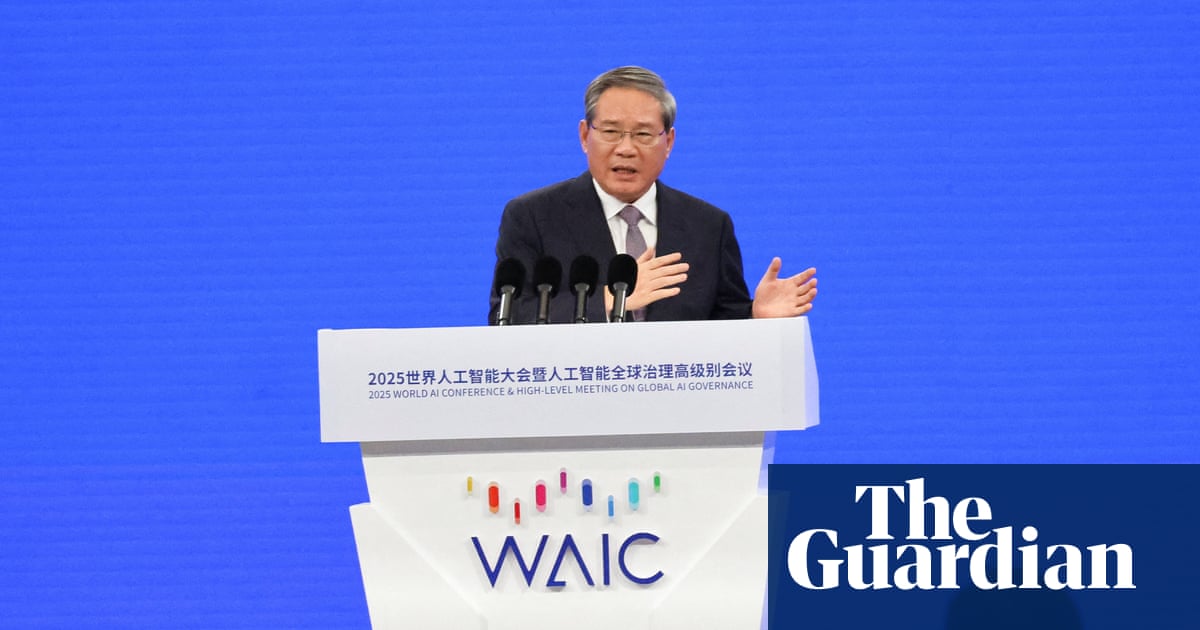China Calls for Global Cooperation on AI at World Conference
Chinese Premier Li Qiang has made a significant proposal for global collaboration in the field of artificial intelligence (AI) during the recent World Artificial Intelligence Conference (WAIC) held in Shanghai. He emphasized the pressing need for countries to synchronize their efforts in both the development and regulation of AI technologies. This call for cooperation comes shortly after the United States introduced a deregulation strategy aimed at maintaining its dominance in this rapidly evolving field.
AI as a Catalyst for Growth
Addressing an audience composed of industry leaders and policymakers, Li described AI as a “new engine for growth.” However, he acknowledged that the governance surrounding the technology is presently fragmented, underscoring the necessity for a widely recognized framework for AI. He highlighted the urgency of establishing global consensus to navigate the security risks associated with AI’s meteoric rise.
The Urgency for Consensus
Li’s comments were particularly pointed as he underscored the balance that must be struck between fostering innovation and ensuring security. He remarked, “The risks and challenges brought by artificial intelligence have drawn widespread attention … How to find a balance between development and security urgently requires further consensus from the entire society.” The urgency of this issue cannot be overstated, given the widespread implications of AI technologies.
Open-Source Development and Global Collaboration
Moving forward, Li indicated that China is committed to promoting the advancement of open-source AI. He expressed Beijing’s willingness to share its technological advancements, particularly with developing countries in the Global South, demonstrating a desire for inclusive progress in the field of AI.
Escalating Technological Rivalry
This call for collaboration comes at a time when the technological rivalry between China and the United States is intensifying. The U.S. has established export restrictions on advanced technologies destined for China, including high-end AI chips manufactured by companies like Nvidia, citing concerns over potential military applications of these technologies. Li did not explicitly mention the U.S. in his remarks but did caution that AI could devolve into an “exclusive game” for a select few nations and companies.
Ethical Dilemmas and Industry Challenges
As AI becomes increasingly integrated across various sectors, the ethical implications of its use are garnering significant attention. Issues such as the spread of misinformation, job displacement, and the potential loss of technological oversight pose considerable challenges. A recent study warned media companies about the potential “devastating impact” AI could have on online audiences, suggesting that up to 80% of clickthroughs could decrease as AI-generated summaries replace traditional search results.
The Significance of the WAIC
The World AI Conference serves as a critical platform for dialogue among global stakeholders in the field of artificial intelligence. This year’s event attracted key figures, including Anne Bouverot, the French president’s special envoy for AI, computer scientist Geoffrey Hinton—often referred to as the “godfather of AI”—and former Google CEO Eric Schmidt. The participation of these figures underscores the conference’s relevance in shaping the future of AI governance.
Notable Absences
Interestingly, Tesla CEO Elon Musk, a frequent contributor to this conference in past years, did not make an appearance this time. His absence raises questions about the shifting dynamics in the tech industry, as companies evaluate their strategies in response to evolving regulations and international relations.
Industry Presence at the WAIC
The exhibition at the conference showcased predominantly Chinese companies like Huawei and Alibaba, along with emerging startups such as humanoid robot manufacturer Unitree. Nevertheless, Western giants like Tesla, Alphabet, and Amazon also participated, indicating a gathering of diverse perspectives in the global AI landscape.
The complexities surrounding AI development make it all the more essential for countries to engage in open dialogue, as highlighted by Li’s call for a structured approach to governance. As these discussions unfold, the world watches closely, keenly aware of the potential impacts AI will have on economies and societies alike.



